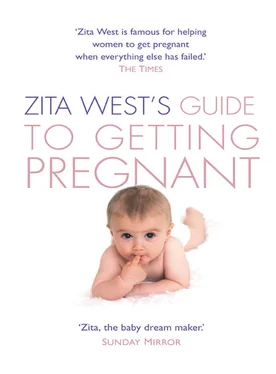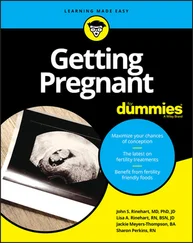• Lifestyle notes (evenings out, alcohol intake, stress at work, travel, holidays, etc.)
• Use of any medicines – such as painkillers for headaches, antihistamines, antibiotics, etc.
• Occasions of full sexual intercourse.
• Libido.
• Physical feelings – abdominal cramps, headache, energy levels, breast tenderness, etc.
• Emotions – moods, happiness, irritation, etc.
Most women need to observe their secretions for about three cycles before they feel confident about recognizing changes. Do bear in mind that keeping a diary is designed to provide you with an overview of your cycle, not a foolproof means to conception. It is all too easy to get obsessive about these things – try to keep a sense of perspective.
One of the reasons keeping a diary is so useful is that it is only possible to evaluate your cycle length retrospectively. It’s only after keeping a note of several cycles that any sort of recognizable pattern will begin to emerge. If you have been on the contraceptive pill, or have no idea of what your cycle length might actually be, then keeping a diary noting down this information before trying to get pregnant can be enormously helpful and quite revealing. It also provides you with an objective record of events, which can be equally helpful in identifying problems such as a fluctuating cycle length, inadequate frequency of sexual intercourse, use of medication, etc.
Even though fertility awareness seems to involve a lot of information, as you become more aware of what is happening during your cycle, it soon becomes second nature. What is important, however, is to remain aware without becoming obsessive. When all’s said and done, the single thing that is most likely to improve your chances of conception is having lots of sex, not just sex at specific times. If you can do this without focusing solely on procreation, but keeping the pleasure in mind, it can only be beneficial for both you and your partner.
What if I have a brown discharge for a few days before my period starts? Does this count as Day 1?
No, Day 1 is the first full flow of blood, the first day of red bleeding.
I have just come off the Pill and want to get my system cleaned up before starting to try for a baby.
Don’t, because research shows that you are more fertile in the first couple of months that you come off the Pill. Getting pregnant can become harder in following months.
Most women get pregnant very quickly after stopping the Pill – in fact, some fertility clinics put women on the Pill to get the ‘rebound’ fertility effect. With newer lower-dose pills, there is no reason to wait for the Pill hormones to get out of your body. There are no adverse effects shown if you get pregnant immediately after stopping the Pill (or other hormonal methods of contraception).
Will it take time to get pregnant following taking the Pill?
Some women get pregnant straight away, while for others it takes time to get their cycles back on a regular basis. It can be harder for some women to conceive after stopping the Pill – particularly if they are over 30 years old and have never had a child. So planning ahead is useful. You could also check your rubella status (by having a simple blood test) while still on the Pill, because if you need to have a vaccination it is essential that you are not pregnant.
One of the disadvantages of the very effective contraceptive Pill, on which many of us rely to control our fertility, is that it wipes out a woman’s individual menstrual cycle, which is of course its aim. The doses of hormones given to achieve this have to be large enough to over-ride a woman’s own hormones, and this tends to blanket any normal fluctuation and effects a woman might recognize.
Coming off the Pill to get pregnant means also getting back in touch with those signs and symptoms of fertility, some of which might not be welcome if the Pill was prescribed for menstrual cramps, acne, mid – cycle spots or other hormone-related aggravations. But it’s important to become familiar with your own cycle, if you don’t become pregnant straight away, and to see these hormonal fluctuations as positive signs of your fertility.
It used to be thought sensible for women coming off the Pill, or stopping any other form of hormonal contraception, to wait a few months for their cycle to regularize and also to allow time for these artificial hormones to be excreted from the body. However, it is now advised not to wait, especially as there is some evidence to show that coming off the Pill kick – starts a woman’s hormonal activity and may actually encourage conception.
The other advantage with being familiar with your own cycle, and what its ups and downs might be, as well as its regularity or otherwise, means that if there are problems with conception you have a baseline for considering what those problems might be.
For some women, once they know what to look for, their personal indicators of fertility are very clear – cut – it’s that, ‘Oh, yes…’ moment. Fertility UK statistics illustrate that over 60 per cent of couples who contact a fertility awareness practitioner via www.fertilityuk.org do so in order to increase their understanding of the menstrual cycle to help plan a pregnancy.
How long can I expect before my periods return following the Pill?
Delays are not uncommon, especially in women over 30. It really helps to understand your cycle. Initially you may experience some irregularities in your cycle, including cycles that are longer than 35 days. Also, you may not ovulate in all cycles. If you are doing a temperature chart you may not get a rise in temperature – this happens, on average, in 10 per cent of cycles. Some women will have no periods (amenorrhea) or a cycle lasting over 90 days.
Am I more likely to have Polycystic Ovary Syndrome (PCOS) after taking the Pill?
It seems that some women who do come off the Pill and then have irregular cycles are diagnosed with Polycystic Ovary Syndrome. The Pill prevents PCOS, as it prevents ovulation and reduces the hormonal activity that causes PCOS, but there is little evidence to suggest that you are more likely to get PCOS after stopping the Pill, if you have not had it before. However, existing PCOS symptoms may have been masked by the Pill – and so become apparent after stopping.
If I am trying to chart my fertility following the Pill, what can I expect?
The first thing to remember is that there are many different types of Pill – some are combined pills containing oestrogen and progestogen (synthetic progesterone), other hormonal preparations (including pills, patches, injections and contraceptive implants) contain progestogen only. The main effect of oestrogen in pill preparations is to prevent ovulation, while the main effect of progestogen is to cause a thick mucus plug at the cervix, stopping sperm from getting through.
After stopping the Pill (or other hormonal contraceptive products) there will be much variability in how long it takes for full ovulation to return and for cervical secretions to return to their most fertile characteristics. Normally these things happen very quickly after stopping contraceptive pills (or sometimes, of course, even if you miss out on taking your pill regularly!), but sometimes it takes several months to a year or more for the return of full fertility.
After stopping the Pill it is possible that you may immediately have regular cycles with clear – cut fertility signs, but many women experience irregular cycles – often longer cycles – and there may be disruptions to the normal pattern of secretions because the progestogen in your pill has kept your cervix tightly closed and plugged with a sticky white mucus to stop sperm from entering. It can take a while for the cervix to start producing the more sperm – friendly wetter, clearer secretions again in good quantities.
Читать дальше












